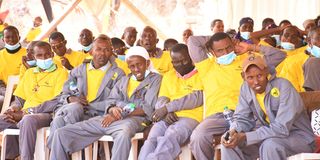Premium
Samburu moran who quit cattle rustling now repairs motorbikes

Regan Leparteleg, a Samburu moran from Lolmolog village, who quit cattle rustling and underwent training to repair motorcycles.
Regan Leparteleg, a Samburu moran from Lolmolog village, has been to several cattle raids and on two occasions, narrowly cheated death.
Before abandoning the practice in 2019, the 32-year-old moran used to live each day to its fullest as he knew however sacred life was, it could come to an end any time, but to him, it would be worth the heroic show.
He says things would get tougher during drought when families lost their livestock and needed to “replenish” their stock.
Though cagey in sharing details of his escapades, Mr Leparteleg says the several cattle raiding missions he was part of were well organised to ensure the tens of armed morans participating in them were not killed. The raids by communities affected by drought are usually undertaken in the wee hours of the morning, at night and late evenings.
“I have been to several raids and I survived (being killed) twice. It is a matter of life and death,” he says and refuses to divulge information on where the morans get the weapons from.
Choice of morans
The choice of the morans to be picked for the attacks depends on the community they intend to raid, with some requiring the best shooters to lead the mission.
On the two instances that he escaped death by whisker, they had ambushed a community in one of the neighbouring counties only to find them on standby. A number of his colleagues were killed in the fierce fire exchange.
Besides the planned raids that target to seize herds of livestock, morans also target livestock traders ferrying animals from the northern counties to Nairobi on the Isiolo-Moyale highway.
Cattle rustling still remains a deeply entrenched cultural practice, with young Samburu warriors — popularly known as morans — stealing the animals not only for restocking but also as a show of heroism besides accumulation of wealth.
The movement of livestock in search of pasture and water — when there is drought — and the proliferation of small firearms in neighbouring counties are some of the drivers of cattle rustling, which remains a serious security threat in the region.
Rustling commercialised
Some politicians allegedly arm the morans and organise the cattle raids and sometimes even pay the warriors to carry out raids in order to get political support and loyalty from certain communities as they seek to safeguard their electoral base.
Unlike before, rustling has been commercialised and is now being used as a conduit for rogue traders to make a killing from the pastoralists’ woes, with communities stealing from each other to satisfy demand for livestock sought by middlemen.
A free vocational training programme by the Northern Rangelands Trust would come as a blessing in disguise for Mr Leparteleg towards end of 2019.
While Covid-19 affected his motorcycle repair classes offered at the local Ltungai community conservancy, the moran started mobile repair business together with his two colleagues while waiting for the resumption of learning.
“We had learnt quite a lot when Covid-19 came and halted the classes. I joined hands with two others and we bought some tools and started mobile motorbike repair while we waited to complete the short course,” Mr Leparteleg told Nation.Africa.
“We used to hire motorbikes to where the client is and they would, besides the charges, also pay for our transport,” he added.
Unlike herding which exposes one’s life to risks in the grazing fields, he said the motorcycle repair job brought him gratification and peace of mind. He earns between Sh1,000 and Sh1,500 daily from the job.
Lack of other people doing the business in his locality and fact that locals were previously hiring mechanics from Maralal, more than 200 kilometres away, gives him an advantage.

Some of the Samburu Morans who completed various courses under the Northern Rangelands Trust's Ujuzi Manyattani vocational training programme during their graduation ceremony on July 30, 2021.
Mobile vocational training
Mr Leparteleg was among 150 youths who graduated on Friday with certificates in courses under the Ujuzi Manyattani training programme at Kalama Wildlife Community Conservancy.
The programme is a vocational mobile training seeking to provide access to learning for youth, men and women from disadvantaged backgrounds and those unable to access formal education. The courses include carpentry, masonry, motorcycle and mobile phone mechanics, plumbing, welding, solar installations and electrical engineering among others.
“I am so happy that the three of us have gotten a tool box and other repair tools. We used to suspend work because the one we had bought could only be used by one person,” an elated Mr Leparteleg said after receiving his certificate.
Twenty-five-year-old Simon Leparmarai, a Class Eight leaver from Westgate area, was happy after completing and graduating with a motorcycle repair certificate.
The skills he acquired, he said, had enabled him get a regular source of income and get married, 11 years after completing primary school.
“I would still be herding goats and hopeless in our village but I now have my small business at Lengusaka market centre and I earn between Sh800 and Sh1,300 daily from both mobile and on site services. I could not have married without a source of income,” he said.
He intends to further his studies into vehicle repair and expand his business to offer job opportunities to local youths.
Educate their children
Like Leparteleg, Mr Leparmarai says they must educate their children to ensure they do not engage in retrogressive practices.
Speaking during the graduation ceremony, Vocational and Technical Training PS Margaret Mwakima hailed the initiative for offering morans an alternative source of livelihood, saying it will go a long way in dealing with the insecurity menace in the region.
Accompanied by her East African Community counterpart Kevit Desai, Dr Mwakima said vocational training is one of the best interventions to unemployment and poverty which compel morans into crime, saying they could only be addressed through education and skills empowerment.
“If we get vocational training right, we will be able to reduce crime, cattle rustling and highway banditry in the region. The morans will have no time to engage in crime,” Dr Mwakima said, while calling on the graduates to use the skills to start businesses to empower themselves.
NRT boss Tom Lalampaa said a total of 209 youths have graduated since 2019 and that the programme targets to train 5,000 young people by 2025.
“Besides empowering communities, we are enabling them have various alternatives to grasp available economic opportunities,” said Mr Lalampaa.
National Industrial Training Authority CEO Stephen Ogenga said they will establish mobile assessment centres for nomadic certification under the Ujuzi Manyattani programme.
Nomadic assessment
“We are working on designing a model for nomadic assessment and certification for the programme so that the trainees, after finishing the courses, are assessed and certified for national certificates,” he said.
Isiolo Deputy Governor Abdi Issa and his Laikipia, Baringo and Samburu counterparts John Mwaniki, Jacob Chepkwony and Julius Leseeto respectively hailed the conservancy’s contribution to communities’ economic empowerment through the programme and called for funding of the youth to start their own businesses.
“The youths should be given loans and incentives to start their own businesses. The programme will help in ensuring peace in the region,” said Mr Chepkwony.
On his part, Mr Mwaniki said the graduates should be attached to government departments for practicals and thereafter funded to start businesses.
“We need to ask ourselves where they will go after graduation,” he said.
Nominated Senator Abshiro Halake asked women to take up male dominated courses such as masonry and welding in order to benefit from upcoming mega national projects such as the Lapsset.
“Do not lock yourselves out of the opportunities. Go for the male dominated courses and address the local shortage of skilled personnel while waiting for the mega projects,” Ms Halake said.





